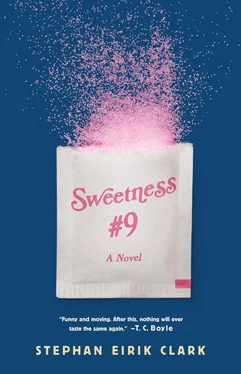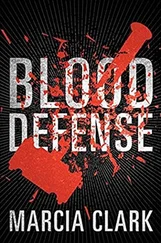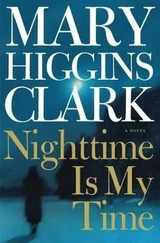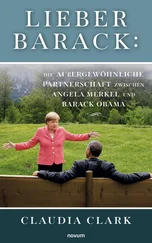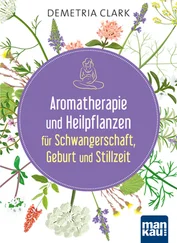“The FDA has gotten almost one hundred different complaints about this one little ol’ sweetener,” the man on the radio said, “and still you think it’s safe?”
“There’s even one listed here as ‘cessation of breathing,’ Mark. Isn’t that the same thing as death?”
“Only if you’re not holding your breath, Bonnie. Only if you’re not holding your breath.”
Priscilla wouldn’t stop looking at me. I had retreated to the table by now, so I took cover behind my newspaper. It provided little relief. All I could see was the photo that ran alongside the profile of Alfred Livingstone Johnson III. It was a close shot of the old man in his gated nursing home bed. He lay there with his eyes closed and his mouth slightly parted, as if he were in the midst of releasing a horrible sound. A fluke and a farce, that’s what he was. Not a rock on which you could build a church. He was like one of those lottery winners who appear on the evening news holding an oversized check. He didn’t make you think you could do it if only you lived as he had; he reminded you of the long odds.
Betty clapped her hands. “You’ve got thirty seconds, E. Do you hear?”
Since Aspirina’s death, we had been trying to occupy our son with as many activities as possible. Today it was a half day of soccer camp, something he tolerated because a friend of his from the Young Druids Club was joining him in his misery.
“Remember to drink plenty of water,” I said, as he rose from the table. “It’ll be a hot one today.”
Nodding, he pushed a cream-filled dessert into his mouth. I have no idea where it came from. Then he was following his mother out through the utility room to the garage, grabbing his soccer cleats and shin guards from the floor before the door closed behind him.
I cleared the table after he left, listening to the radio station as it went to a commercial break. The second spot to play advertised Sweetness #9—What Is to Be Done? a report documenting all the peculiarities of the sweetener’s approval process and the many hazards of its use.
“Completed after years of impartial research by a team of Albanian scientists far removed from the power brokers in Washington, this essential, two hundred and forty-three-page document can be yours for only $19.95. If you call in the next thirty minutes…”
I set my son’s bowl in the sink. “The next thirty minutes.”
“Shh!”
“That’s 1-800,” and now Priscilla was scribbling down the number.
“You can’t be serious,” I said.
“Can I use your credit card?”
“What could you possibly need it for?”
She returned her pencil and a reporter’s notebook to the vast marsupial front pocket of her black hooded sweatshirt. This was what she’d retreated to after dropping her pom-poms — the high school paper. Even the summer recess hadn’t stalled her new obsession. “The truth never sleeps,” she’d told me.
“Does it matter?” she said now.
And I knew the answer as well as she did: no. When she was in the first grade and came home to ask for a pink phone, we got her one even though she didn’t have anyone to call. Then there was her My Little Pony phase and all the Hello Kitty outfits and paraphernalia you could imagine — one thing after another we’d bought for her, never once stopping to consider the question of need or utility. Why should I expect that to change now?
“I could always ask Sarin’s dad,” she said. “You’re not the only one with a credit card, you know.”
And so it was pointless to resist. My one summer training to be a lifeguard had taught me that. You only tire yourself out going against the current. Better to let the riptide take you where it will, then pop up above the waterline and move in to shore without a struggle.
“If you give me the number,” I said, “I’ll place the order for you at work.”
The first hint of a smile. “You will?”
I held out my hand—“though I still don’t know what purpose it will serve”—and then she was tearing the sheet of paper from her notebook and giving it to me. “Thanks,” she said, smiling freely now, though only for a moment — a honk came from outdoors. “Sarin!” she said. Just as quickly, as if she’d heard the first wail of an air-raid siren, she was running for the door.
“Will you be back for dinner?”
“I don’t know! I’ve got my phone!”
As the front door slammed shut behind her, I was striding into the dining room to watch through the window as she ran down the lawn toward an ancient Volkswagen Bug covered in bumper stickers memorializing every failed liberal campaign since McGovern and the manatee. The driver was a wispy young thing with a pink scarf wound round through the base of her puffy little Afro. She’d transferred into South Battle Station High School the previous fall, after Priscilla’s sophomore year had already begun. They met in journalism class and by February were crouching down together in the wilds of a nearby state park to count frogs for a local 501c. Ever since, they’d been inseparable, though because they preferred to “hang out” at Sarin’s house (for reasons I chose not to dwell on), I’d met the girl in person only once before.
The one time Sarin had spent the night at our place, the girls had stayed up late in the great room, mocking romantic movies on the big screen. I came in at one point to offer them a bag of popcorn I’d seasoned with some white cheddar flavoring, but from the way they looked at me you would’ve thought I’d suggested they eat a bowl of anthrax.
“I’m a vegan,” Sarin said, as if that were explanation enough.
I tried to tell her she had no reason to worry. “The cheese flavoring,” I said, “was in no way derived from animal by-products. I should know. I made it myself.”
“Well”—and she shared a conspiratorial look with my daughter—“I’m not one of those vegans who eats fake pepperoni or sausage. If meat is murder, why would anyone want to simulate it?”
I should’ve known to surrender (there is no arguing with a teenaged vegan), but I thought some jalapeño-flavored popcorn might appeal to them instead. I had three cases of flavored salts in the garage — caramel, sour cream and onion, a half-dozen varieties in all — the lot of it a thank-you gift from a client whose sales were up 24 percent since releasing the “new and improved flavors” that we at FlavAmerica had created.
“You don’t get it,” my daughter finally put in. It wasn’t that jalapeños and popcorn didn’t go well together; it was that she and Sarin believed it wrong to achieve this rarefied combination of flavors without first going to the bother of chopping up a jalapeño themselves. “Do we have any in the fridge?” she asked.
“Jalapeños? No. Only pickles, I think.”
“We’re fine, then.”
I told her she was being ridiculous, but she only wondered how this was any different from my position on welfare. “If that money provides incentives for people to remain poor, how does eating something ready-made teach me to be self-reliant?”
I was starting to realize how unfair parenthood could be. You raised a child up right, or as right as you knew how, and then a woman died of breast cancer in Berkeley, California, catapulting her daughter clear to the other side of the country so she could spread an influence that otherwise might never have appeared.
I didn’t like it. I wanted to go back to the glories of the Reagan Years, back before the crash of the Dow Jones Industrial Average and the flattening of the seltzer market. (The two events followed each other so closely that they have since become one in my mind: Black Cherry Monday.) But there was no going back, I was beginning to suspect. I was Humpty Dumpty, and not only had I fallen, I’d watched as my wall had come tumbling down on top of me.
Читать дальше
